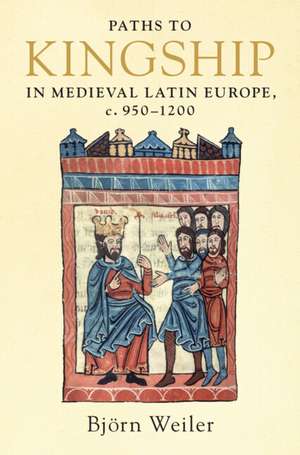Paths to Kingship in Medieval Latin Europe, c. 950–1200
Autor Björn Weileren Limba Engleză Hardback – 13 oct 2021
Preț: 277.57 lei
Nou
53.11€ • 56.80$ • 44.28£
Carte disponibilă
Livrare economică 27 martie-10 aprilie
Livrare express 12-18 martie pentru 46.59 lei
Specificații
ISBN-10: 1316518426
Pagini: 300
Dimensiuni: 160 x 235 x 30 mm
Greutate: 0.82 kg
Ediția:Nouă
Editura: Cambridge University Press
Colecția Cambridge University Press
Locul publicării:Cambridge, United Kingdom
Cuprins
Introduction. Part I. Foundations: 1. Politics and Power in High Medieval Europe, c. 1000–1200; 2. Foundational Texts. Part II. Creating Kingship: 3. Becoming King; 4. Conferring Kingship. Part III. Succession: 5. Duties, Norms and Process; 6. Designating an Heir. Part IV. Election: 7. Unanimity and Probity; 8. Choosing a King. Part V. Inauguration: 9. Enthroning the King; 10. Beyond Enthronement; Conclusion.
Recenzii
Descriere
Medieval Europe was a world of kings, but what did this mean to those who did not themselves wear a crown? How could they prevent corrupt and evil men from seizing the throne? How could they ensure that rulers would not turn into tyrants? Drawing on a rich array of remarkable sources, this engaging study explores how the fears and hopes of a ruler's subjects shaped both the idea and the practice of power. It traces the inherent uncertainty of royal rule from the creation of kingship and the recurring crises of royal successions, through the education of heirs and the intrigue of medieval elections, to the splendour of a king's coronation, and the pivotal early years of his reign. Monks, crusaders, knights, kings (and those who wanted to be kings) are among a rich cast of characters who sought to make sense of and benefit from an institution that was an object of both desire and fear.
